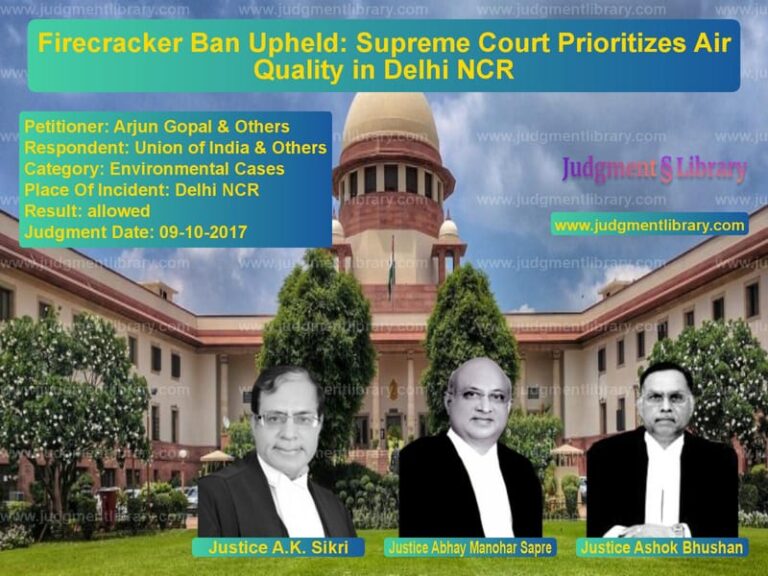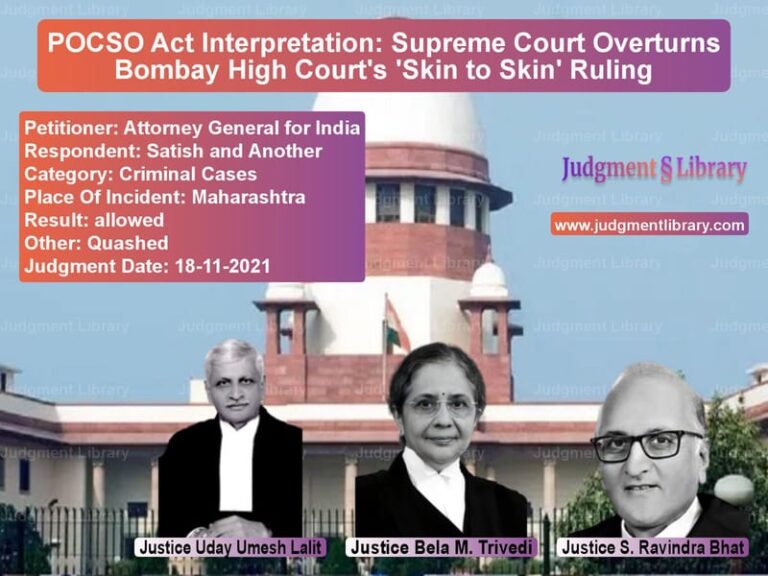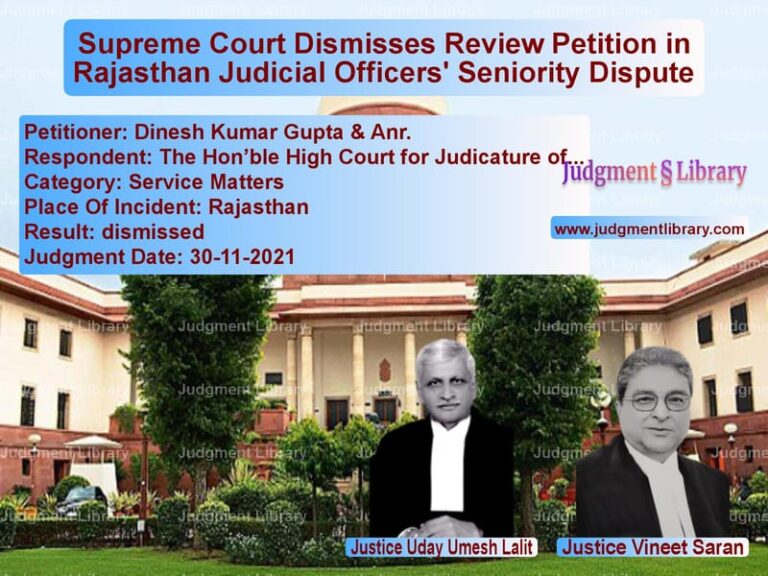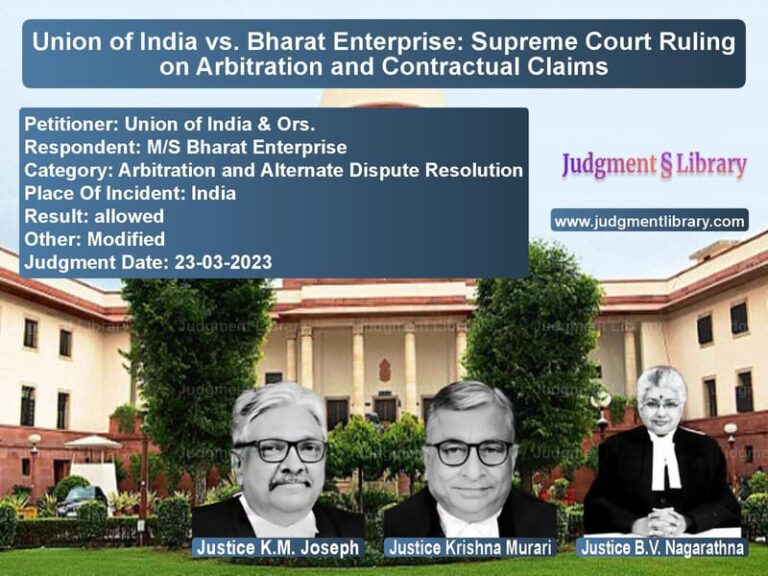Supreme Court Grants Divorce with Alimony: Landmark Judgment on Irretrievable Breakdown of Marriage
The case of Usha Uday Khiwansara vs. Uday Kumar Jethmal Khiwansara is a significant ruling concerning the irretrievable breakdown of marriage and the power of the Supreme Court under Article 142 of the Constitution of India. The Supreme Court was asked to decide whether the divorce granted by the High Court without hearing the wife should be upheld, modified, or set aside.
Background of the Case
The appellant, Usha Uday Khiwansara, and the respondent, Uday Kumar Jethmal Khiwansara, were married on February 7, 1992. However, their marriage turned sour, leading the respondent (husband) to file a divorce petition in 2004 before the Family Court in Pune on the grounds of cruelty and desertion.
The Family Court, after reviewing the evidence, dismissed the divorce petition on June 19, 2007, stating that the husband had failed to prove cruelty or desertion by the wife.
Feeling aggrieved, the husband filed an appeal before the Bombay High Court (FCA No. 155/2007). The High Court, without hearing the wife (who was absent during the proceedings), granted the divorce on the ground of desertion on August 14, 2014. This decision led the wife to approach the Supreme Court, seeking justice.
Legal Issues Raised
1. Right to Be Heard
Should a divorce decree granted without hearing the wife be set aside?
2. Irretrievable Breakdown of Marriage
Should the Supreme Court exercise its power under Article 142 of the Constitution to grant divorce when both parties have been living separately for a long period?
3. Alimony and Financial Settlement
What should be the reasonable financial compensation for the wife given her financial condition and medical needs?
Arguments by the Parties
Arguments by the Petitioner (Wife – Usha Uday Khiwansara)
- She was not heard by the High Court, which deprived her of her right to a fair hearing.
- The allegations of desertion made by the husband were false and unproven.
- She has no independent income and is entirely dependent on her family for survival.
- She has been suffering from health issues and requires financial support.
Arguments by the Respondent (Husband – Uday Kumar Jethmal Khiwansara)
- The marriage had completely broken down, and they had been living separately for over a decade.
- There was no possibility of reconciliation, and prolonging the marriage served no purpose.
- He was willing to provide a financial settlement to the wife to ensure her well-being.
Supreme Court’s Observations
1. Right to Fair Hearing Violated
The Supreme Court noted that the High Court granted divorce without hearing the wife, which was a violation of the principles of natural justice. The judgment stated:
“Since the appellant-wife stood denied of a chance to represent her case before the High Court, the logical consequence would normally have been to set aside the judgment and order under appeal and remit the matter for fresh consideration.”
2. No Possibility of Reconciliation
The Court observed that the couple had been living separately for over a decade and that their marriage was beyond repair. The judgment stated:
“It is clear that there is absolutely no chance of both coming together to continue their marital life. It has also come on record that there is no issue born out of wedlock.”
3. Financial Support for the Wife
The Court acknowledged the wife’s medical condition and financial dependency. The judgment directed:
“On making a payment of Rs.30,00,000/- (Rupees thirty lakhs) by the respondent-husband towards permanent alimony to the petitioner-wife, the marriage between the parties shall stand dissolved.”
4. Additional Goodwill Gesture by the Husband
The Court also ordered the husband to pay an additional Rs.5,00,000 as a gesture of goodwill to assist the wife with her medical expenses.
Final Judgment
The Supreme Court disposed of the appeal with the following directives:
- The marriage is dissolved under Article 142 of the Constitution.
- The husband must pay Rs.30,00,000 as permanent alimony to the wife.
- The husband must pay an additional Rs.5,00,000 towards the wife’s medical expenses.
- All pending cases between the parties are disposed of.
Implications of the Judgment
This ruling has significant implications for divorce and alimony cases:
- Protects the Right to Be Heard: Ensures that courts cannot grant divorce without hearing both parties.
- Recognizes Irretrievable Breakdown of Marriage: Confirms that prolonged separation is grounds for divorce.
- Sets Precedent for Fair Alimony: Ensures financial security for dependent spouses.
- Encourages Amicable Settlements: Promotes financial settlements rather than prolonged litigation.
Conclusion
The case of Usha Uday Khiwansara vs. Uday Kumar Jethmal Khiwansara is a landmark judgment in divorce law. The Supreme Court’s decision to grant divorce while ensuring financial support for the wife balances legal fairness with social justice. This ruling will serve as a key precedent for future divorce cases involving long separations and financial settlements.
Petitioner Name: Usha Uday Khiwansara.Respondent Name: Uday Kumar Jethmal Khiwansara.Judgment By: Justice Abhay Manohar Sapre, Justice Uday Umesh Lalit.Place Of Incident: Pune, Maharashtra.Judgment Date: 17-07-2018.
Don’t miss out on the full details! Download the complete judgment in PDF format below and gain valuable insights instantly!
Download Judgment: Usha Uday Khiwansara vs Uday Kumar Jethmal K Supreme Court of India Judgment Dated 17-07-2018.pdf
Direct Downlaod Judgment: Direct downlaod this Judgment
See all petitions in Alimony and Maintenance
See all petitions in Divorce by Desertion
See all petitions in Domestic Violence
See all petitions in Judgment by Abhay Manohar Sapre
See all petitions in Judgment by Uday Umesh Lalit
See all petitions in allowed
See all petitions in supreme court of India judgments July 2018
See all petitions in 2018 judgments
See all posts in Divorce Cases Category
See all allowed petitions in Divorce Cases Category
See all Dismissed petitions in Divorce Cases Category
See all partially allowed petitions in Divorce Cases Category







